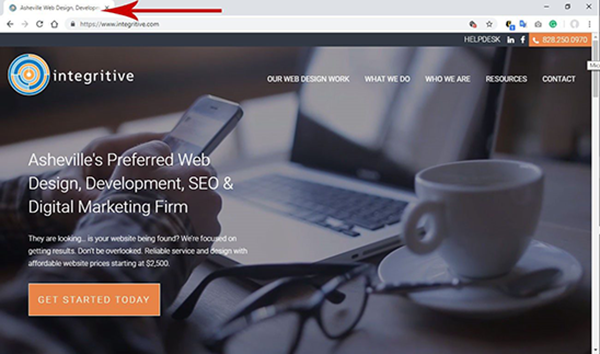Improve your Google ranking and bring more customers to your business
Small business owners have it tough. Not only are you up against other local businesses, but you’re also competing with big-box retailers, online vendors, and chain stores. Locally targeted marketing is vital to keeping your name top of mind when a customer chooses where to make a purchase.
In addition to your online marketing budget, there are simple ways to optimize your business for local searches.
1. Set up your Google My Business account
Where to start: google.com/business
Google’s free tool lets you manage your business’ information displayed in Google search results. You can add hours, contact information and even photos. It’s truly a win-win: You get a company listing on Google search pages, images, and maps; Google makes it easy for customers to find and contact you.
You can see how this information might be displayed on a search results page.
To set up your business listing, you’ll need a Google account (if you have a Gmail address, use that information).
Go to google.com/business and follow the user-friendly steps for adding a location. If your listing already exists, you can verify ownership and update the details.
We recommend to include your business information in your listing exactly the same way as it appears on your website. For example, if you use Suite 2A vs. Ste. 2A, keep it the same. Use the same phone number that’s on your website for all listings as well.
Bonus tip: Add photos. They boost your search engine visibility and help potential customers.
2. Set up Bing Places for Business
Where to start: bingplaces.com
Similar to Google My Business, Microsoft’s Bing search engine offers free business listings including business hours, contact information and photos The interface and set-up process allows you to import the data you just added in Google!
Bonus tip: Don’t overlook the second-most-popular search engine in the U.S.!
3. Claim your Yelp business listing
Where to start: biz.yelp.com
Yelp is its very own search engine featuring user-submitted reviews and photos for businesses and attractions. Being listed on a review site can be scary – customers can say whatever they want! However, you, as the business owner, have the opportunity to identify issues within your organization and respond to complaints directly. (Read our article on how to manage negative online reviews for help.)
Bottom line: If you’re a brick-and-mortar establishment such as a restaurant, accountant’s office, mechanic, coffee shop, clothing store or hair salon, you need to embrace and actively manage your Yelp account.
The set-up process with Yelp is similar to Google and Bing. Either request a new listing or claim an existing one and edit your company’s information.
Bonus tip: Effective Yelp listings are heavy on photos. Have some ready ahead of time for best results. Respond to any negative reviews quickly and kindly with good customer service.
4. Set up (and maintain!) social media accounts
Where to start: Facebook, Twitter, LinkedIn, Instagram, Pinterest
Mention the words “social media” and many small business owners will heave a collective sigh of dismay. Social media has become yet another thing to tack onto your ever-growing list of responsibilities.
That said, maintaining a social media presence for your business is important for several reasons:
- Social media helps potential customers find more personalized information about you.
- It creates an opportunity for interaction, therefore increasing leads and customer loyalty.
- It gives your business a personality. Customers like relating with people, not corporations. This is especially important for independently owned businesses.
- Advertising can be highly targeted and inexpensive.
- Social media channels are their own search engines!
The question is always: Does social media affect SEO?
The answer is Yes.
Technically, having social media accounts or a high number of followers doesn’t increase search engine rankings. (You can read more about that here.) However, your social profiles will pop up in a search result – usually in the very top spots!
Plus, if your social media fans start to share your posts, you’ll turn up in their friends’ feeds, and their friends’ friends’ feeds, and so on. Google and Bing have both indicated, implicitly and explicitly, that they take into account the popularity of shared content into their search results.
The trick? Keep your accounts updated! Don’t open a profile you can’t maintain; lack of updates or an incomplete business page makes your business look abandoned and unprofessional.
Not sure which social media platforms are right for you? Go with wherever your customers or clients are most engaged (for example, a leadership coach is a great fit for LinkedIn). We can help you determine where your customers are active, and which platforms are the best fit for you.
Bonus tip: Our digital marketing strategy includes an audit of your social media accounts to help you look your best.
5. Add a map and contact information to your website
Where: Throughout your site
Adding your address and phone number on your website seems like a no-brainer, right? Yes, but make sure your contact information is as easy to find as humanly possible. Just because you have a contact page doesn’t mean that’s the only place a customer will look.
We recommend strategically placing your contact information and a quick way to get directions to your business to the footer, and often the header and/or sidebar on your site.
If you’re not sure how to add this information to your site, give us a call. Even if we didn’t build your website, we can help you make edits or add information to be sure people can get in touch with you.
Bonus tip: Consider adding a Google or Bing map with a link to get directions to make it easy for customers to find you in one click.
6. Add your city and business category to page titles
Where: Your website’s content management system or HTML files
Take a look at the tab in your browser for this web page. Each tab you have open should have a page title. This title is one of the first ways that search engines and site visitors know what your page is about.
A small but effective step is to give your pages unique names that incorporate your location + business category: e.g., “Asheville Hair Extensions by Sally Jones” or “Hendersonville Donut Shop | Joe’s Donuts”.
Bonus tip: Search engines are very savvy at recognizing what’s called “keyword stuffing” – that is, stuffing as many instances of your desired keywords as possible throughout the site. If you “stuff” your page titles and website text, your website can be penalized or even blacklisted from search engines.
Get Started
There is a lot involved in making sure you’re leveraging your website to get local business. Beyond the basics, the possibilities for improving your local search engine rankings are practically limitless. Investing in targeted, local marketing can yield results many times over your initial costs.
As a business owner, you have a lot of other responsibilities to keep things up and running, so give us a call if we can help out with setting up any of these steps to keep customers coming to your door. Fill out our contact form to set up a free consultation.

